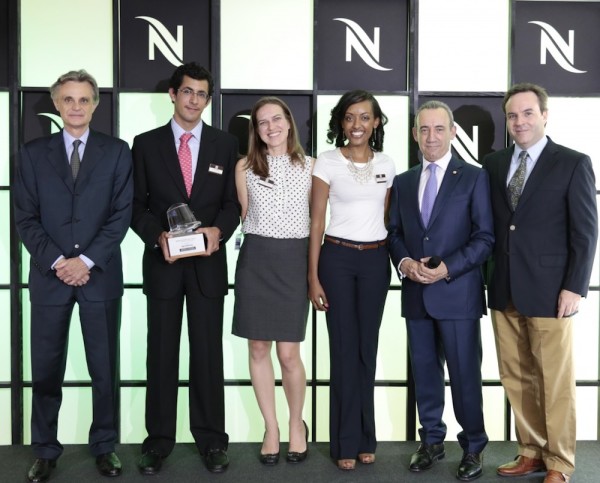For the second year running, Nestlé Nespresso has looked to the academic business world for ideas to fold into the Swiss mega-roaster and pod-maker’s sustainability plans.
Sustainability in the single-serve pod segment is arguably an oxymoronic concept, but if nothing else, the second annual Nespresso MBA Challenge gives the coffee world a fresh perspective on how some of the brightest minds in business might approach large-scale sustainability issues.
(related: Nespresso to To Tim Wendelboe: Our Quality Matches Yours)
In partnership with the Latin American business school INCAE and the Sustainable Markets Intelligence Center, Nestlé Nespresso reached out to MBA programs throughout the globe, this year receiving proposals from 70 different teams of students. Three finalists were flown to Europe last month to make their presentations to a panel of judges that included academic professors, Nestlé executives and some representatives from independent sustainability organizations.
(related: George Clooney Acting as Nespresso Brand Ambassador for Sustainability Projects)
The winning team, from the Ross School of Business at the University of Michigan, was composed of MBA candidates Yodit Beyene, Kaitlyn Browne, Luis Ordoñez and Santiago Proaño, who provided a three-point, “1 for 1” plan for the company that included:
- Using the Nespresso machine point-of-sale to engage customers on carbon footprint issues. The team proposed an upfront offsetting strategy in which one acre or hectare of reforestation would be provided for each machine purchased.
- Centralizing the wet milling process, reducing carbon emissions in processing by 25, and increasing AAA coffee by 50 percent. (Note: In collaboration with the Rainforest Alliance, Nespresso maintains a AAA Sustainable Quality program that provides farmers with technical assistance in areas like water management and shade-tree planting.)
- Planting indigenous trees at the coffee farms to provide more shade on 10 percent of the land.
Other finalists included a team at Yale that focused on “circular economy principles” for “scaling up” of sustainability operations throughout the globe, as well as “climate change hedging,” while a team at Rollins College created a program of premiums incentives (10 percent) for farmers willing to invest in sustainable practices.
It is not clear whether the Nestlé Nespresso will run with any part of these plans — the company only says that the winners will be “given the opportunity to contribute to the company’s sustainability strategy.”
Nick Brown
Nick Brown is the editor of Daily Coffee News by Roast Magazine.







Comment